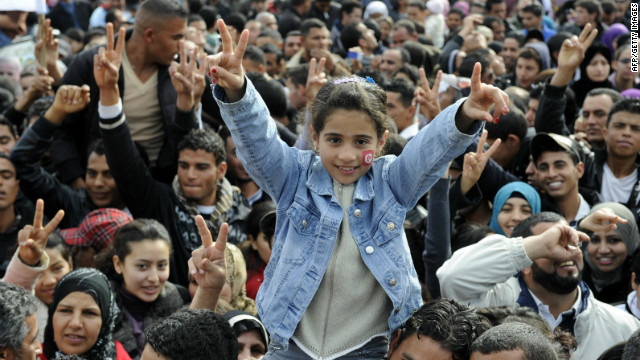- Joined
- Sep 6, 2010
- Messages
- 3,985
- Points
- 0
Mohamed Bouazizi: A fruit seller's legacy to the Arab people
By Salman Shaikh, Special to CNN
December 17, 2011 -- Updated 1423 GMT (2223 HKT)

Crowds gather Saturday in Mohamed Bouazizi square, Sidi Bouzid, Tunisia, named after the fman whose self-immolation sparked the Arab Spring.
(CNN) -- Mohamed Bouazizi's self-immolation one year ago was an act which symbolized the frustration and desperation of millions in the Arab world, setting into motion a series of revolutions across the Middle East and North Africa.
His was a cry for dignity, justice, and opportunity, which continues to be heard around a region undergoing tumultuous change. In today's Middle East, people matter. Many are now engaged in what could be a life-long struggle to fight long-standing grievances and take greater control of their lives. This process must involve the creation of new democratic political systems, which ensure greater accountability of leaders, and level the playing field of opportunity for all, not just a select few.
It has been a remarkable year. Three dictators have been toppled and one has transferred power to a deputy. Nonetheless, analysts and policy-makers continue to speak about the slow pace of change in the region and warn of the onset of an "Arab Winter." Such distinctions -- spring and winter -- are misleading. Many seasons will come and go in the transformative years that lie ahead for the Arab world. Revolutions take time to settle. The transformation of societies takes even longer. The colored revolutions of Eastern Europe, two decades on, are still developing. It took centuries for democratic systems to be refined in Europe. We cannot expect democracy in the Middle East to be solidified in only one year.
Still, across the region, there is cause for concern. Egypt's transition to civilian rule carries major worries, even as Egyptians continue to go to the polls. The concern remains that the ruling military council will relinquish power only under heavy pressure; and Egypt's economy and confidence are in nosedive as the populace awaits civil rule. Syrians meanwhile face a regime intent on killing and torturing its citizens to end their uprising. All this as a largely impotent international community argues over how to stop the increasing violence.
In Yemen, many are not convinced by a regionally brokered transition deal, which allows Saleh and his family immunity from prosecution as well as continued political influence. Bahrain continues to reel from the absence of a genuine national dialogue between its rulers and the underrepresented and relatively impoverished majority Shia community. Libya's revolutionaries now face the immediate challenge of building a state from scratch, based on the rule of law and democratic principles. To do so, they are learning, they will first have to put down their guns.
http://It has been a remarkable yea... they will first have to put down their guns.http://edition.cnn.com/2011/12/16/world/meast/bouazizi-arab-spring-tunisia/index.html?hpt=hp_bn8
By Salman Shaikh, Special to CNN
December 17, 2011 -- Updated 1423 GMT (2223 HKT)

Crowds gather Saturday in Mohamed Bouazizi square, Sidi Bouzid, Tunisia, named after the fman whose self-immolation sparked the Arab Spring.
(CNN) -- Mohamed Bouazizi's self-immolation one year ago was an act which symbolized the frustration and desperation of millions in the Arab world, setting into motion a series of revolutions across the Middle East and North Africa.
His was a cry for dignity, justice, and opportunity, which continues to be heard around a region undergoing tumultuous change. In today's Middle East, people matter. Many are now engaged in what could be a life-long struggle to fight long-standing grievances and take greater control of their lives. This process must involve the creation of new democratic political systems, which ensure greater accountability of leaders, and level the playing field of opportunity for all, not just a select few.
It has been a remarkable year. Three dictators have been toppled and one has transferred power to a deputy. Nonetheless, analysts and policy-makers continue to speak about the slow pace of change in the region and warn of the onset of an "Arab Winter." Such distinctions -- spring and winter -- are misleading. Many seasons will come and go in the transformative years that lie ahead for the Arab world. Revolutions take time to settle. The transformation of societies takes even longer. The colored revolutions of Eastern Europe, two decades on, are still developing. It took centuries for democratic systems to be refined in Europe. We cannot expect democracy in the Middle East to be solidified in only one year.
Still, across the region, there is cause for concern. Egypt's transition to civilian rule carries major worries, even as Egyptians continue to go to the polls. The concern remains that the ruling military council will relinquish power only under heavy pressure; and Egypt's economy and confidence are in nosedive as the populace awaits civil rule. Syrians meanwhile face a regime intent on killing and torturing its citizens to end their uprising. All this as a largely impotent international community argues over how to stop the increasing violence.
In Yemen, many are not convinced by a regionally brokered transition deal, which allows Saleh and his family immunity from prosecution as well as continued political influence. Bahrain continues to reel from the absence of a genuine national dialogue between its rulers and the underrepresented and relatively impoverished majority Shia community. Libya's revolutionaries now face the immediate challenge of building a state from scratch, based on the rule of law and democratic principles. To do so, they are learning, they will first have to put down their guns.
http://It has been a remarkable yea... they will first have to put down their guns.http://edition.cnn.com/2011/12/16/world/meast/bouazizi-arab-spring-tunisia/index.html?hpt=hp_bn8
